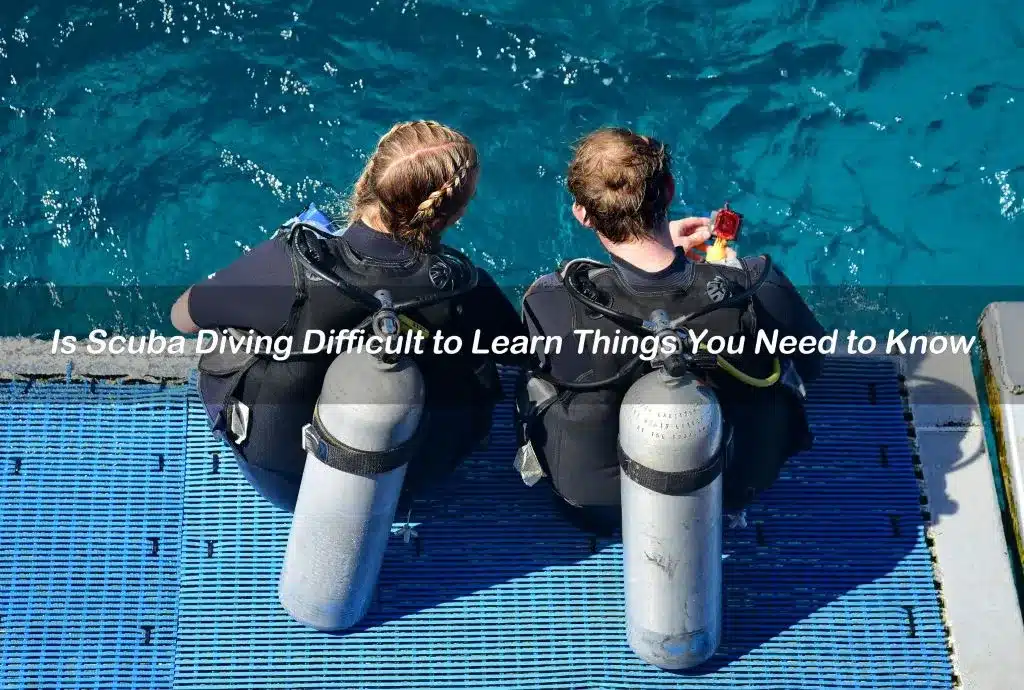Blog
Is Scuba Diving Difficult to Learn? The Truth You Need to Know
Have you ever watched scuba divers gliding through coral reefs and thought, “I’d love to try that”? But then, almost immediately, you wonder: Is scuba diving too hard to learn?
Don’t worry—you’re not alone. Many beginners have the same concerns before their first dive.
The good news is: scuba diving is much easier to learn than you might expect, especially with the right mindset, professional instruction, and a little preparation.
In this article, we’ll walk you through the learning process, possible challenges, and everything you need to know as a new diver.
Is Scuba Diving Difficult? Not as Complicated as You Think
Yes, scuba diving does require learning some new skills—like breathing underwater, managing buoyancy, and equalizing ear pressure. But all of these are taught step by step in certified dive courses.
Most people complete their Open Water Diver certification in just 3 to 5 days. The course is internationally recognized, taught progressively, and designed for beginners with no prior experience.
What Will You Learn in a Beginner Scuba Course?
If you’ve been searching how to learn to scuba dive, here’s what a standard Open Water Diver course usually includes:
- Basic scuba theory (pressure principles, safety knowledge, how to use equipment)
- Practice in pools or calm water (breathing skills, clearing water, buoyancy control)
- Four open water dives over two days
- Equipment assembly and pre-dive inspection
- Emergency procedures and underwater hand signals
Courses are typically taught in stages and led by professional instructors. You don’t have to be a strong swimmer—as long as you’re healthy and feel comfortable in the water, you can do it.
Mental Blocks vs. Real Challenges
Common concerns new divers have include:
- Is breathing underwater uncomfortable? It may feel strange at first, but you’ll get used to it within minutes.
- Will my ears hurt underwater? With proper equalization techniques, you can avoid this discomfort.
- What if I feel scared or anxious? Open water is usually spacious and calming once you adapt.
- Is the gear too complicated? Not at all—your instructor will guide you step by step.
The truth is, most of these challenges are mental, not physical. With a professional instructor and gradual exposure, nearly all beginners overcome them and begin to enjoy the freedom of diving.
Mini Scuba Gear: A Lighter Choice for Beginners
Many first-timers feel overwhelmed by traditional scuba gear—it looks bulky and complex. But mini scuba tanks are changing that. Compact, lightweight, and beginner-friendly, they make it easier to get started.
Take the SMACO S700 as an example. It supports both manual and portable pump refills, making it easy to use without depending on large compressors or dive shops. It’s perfect for casual training or travel.
Mini scuba tanks are ideal for:
- Practicing underwater breathing
- Emergency air supply on boats
- Shallow freediving experiences
- Lightweight diving setups for trips
For those just beginning to explore scuba diving, mini tanks lower the entry barrier and make diving more flexible and accessible.
Scuba Diving Is Just the Beginning of a Bigger Journey
Once you complete your first certification, you’ll have the opportunity to advance further. Many divers go on to take courses like the Advanced Open Water Diver, and explore wreck diving, night diving, or even cave diving.
Scuba diving is more than a skill—it’s a lifestyle of exploration and connection with nature.
✅ Tips for First-Time Divers
- Choose a certified dive school with experienced instructors
- Stay physically well before your course
- Practice slow, steady breathing to stay calm and control buoyancy
- Don’t skip the theory—understanding the “why” increases your confidence
- Ask questions—your instructor is there to help
Final Thoughts: You Can Do This!
Scuba diving isn’t hard to learn. It’s a structured, guided activity created with beginners in mind. If you’re ready to try, the underwater world is waiting.
That first breath beneath the surface may just be your first step into a whole new world.
Reference articles:
- 10 Scuba Diving Mistakes Beginners Make
-
Mini Scuba Tank Buying Guide: Everything You Need to Know Before You Dive
